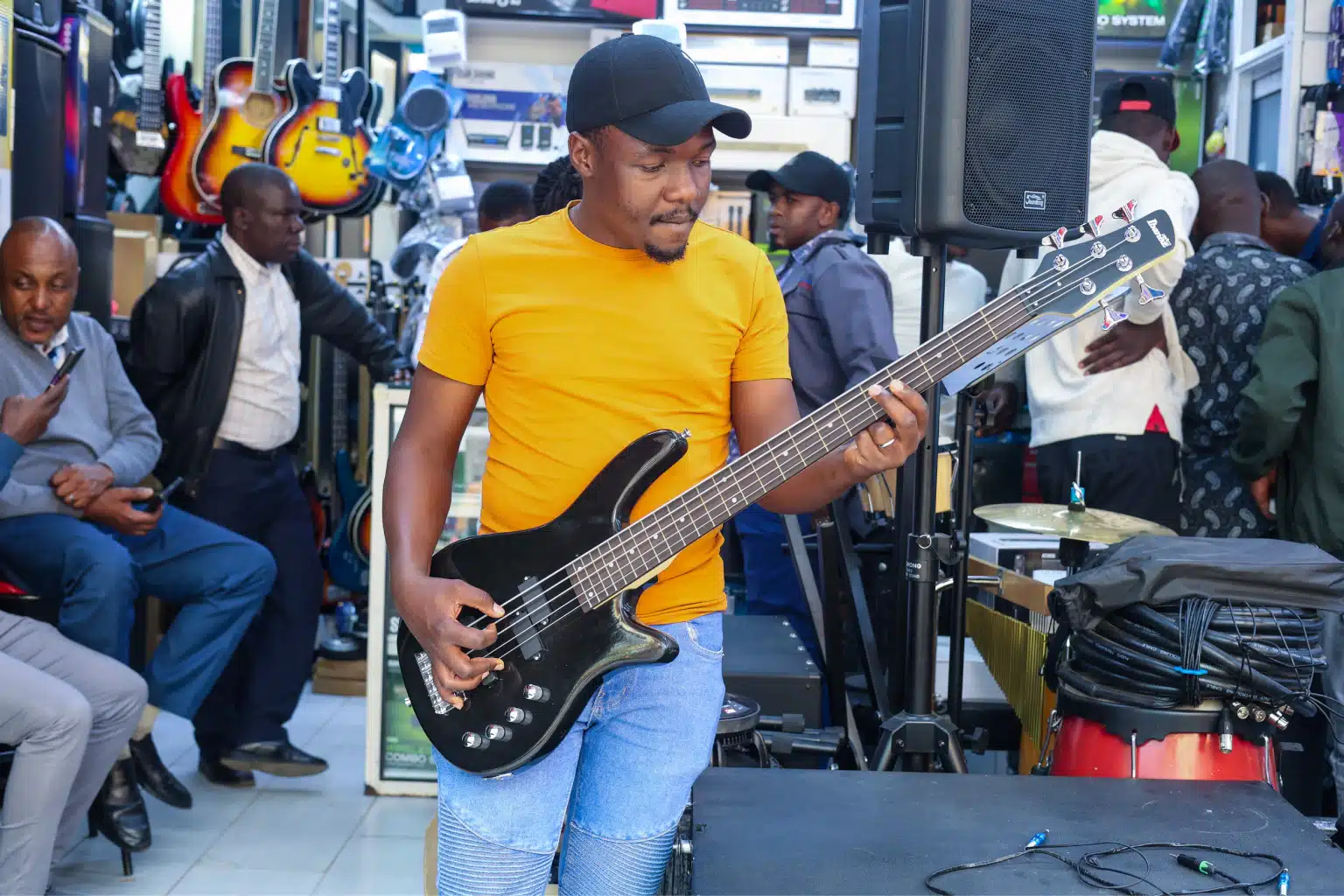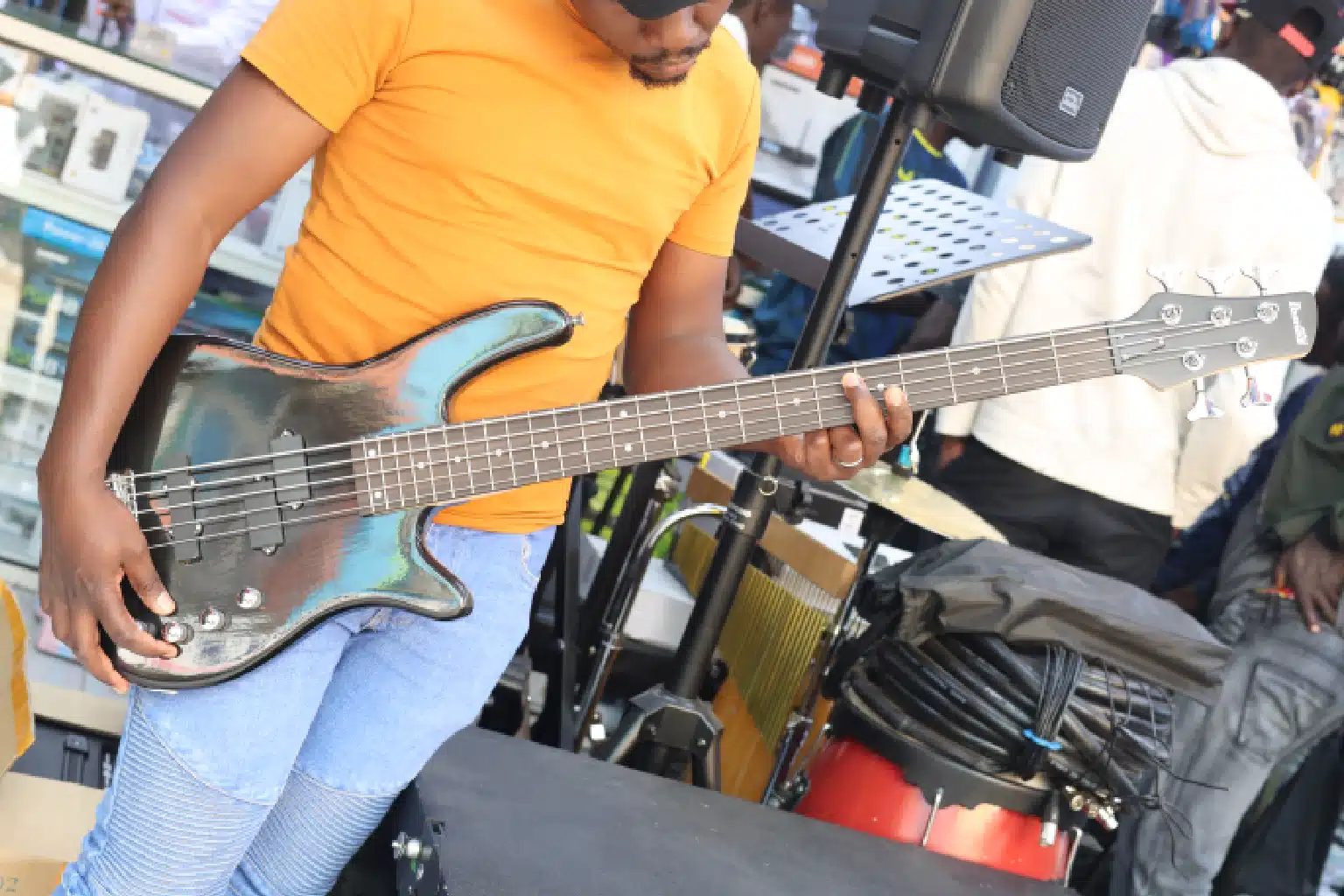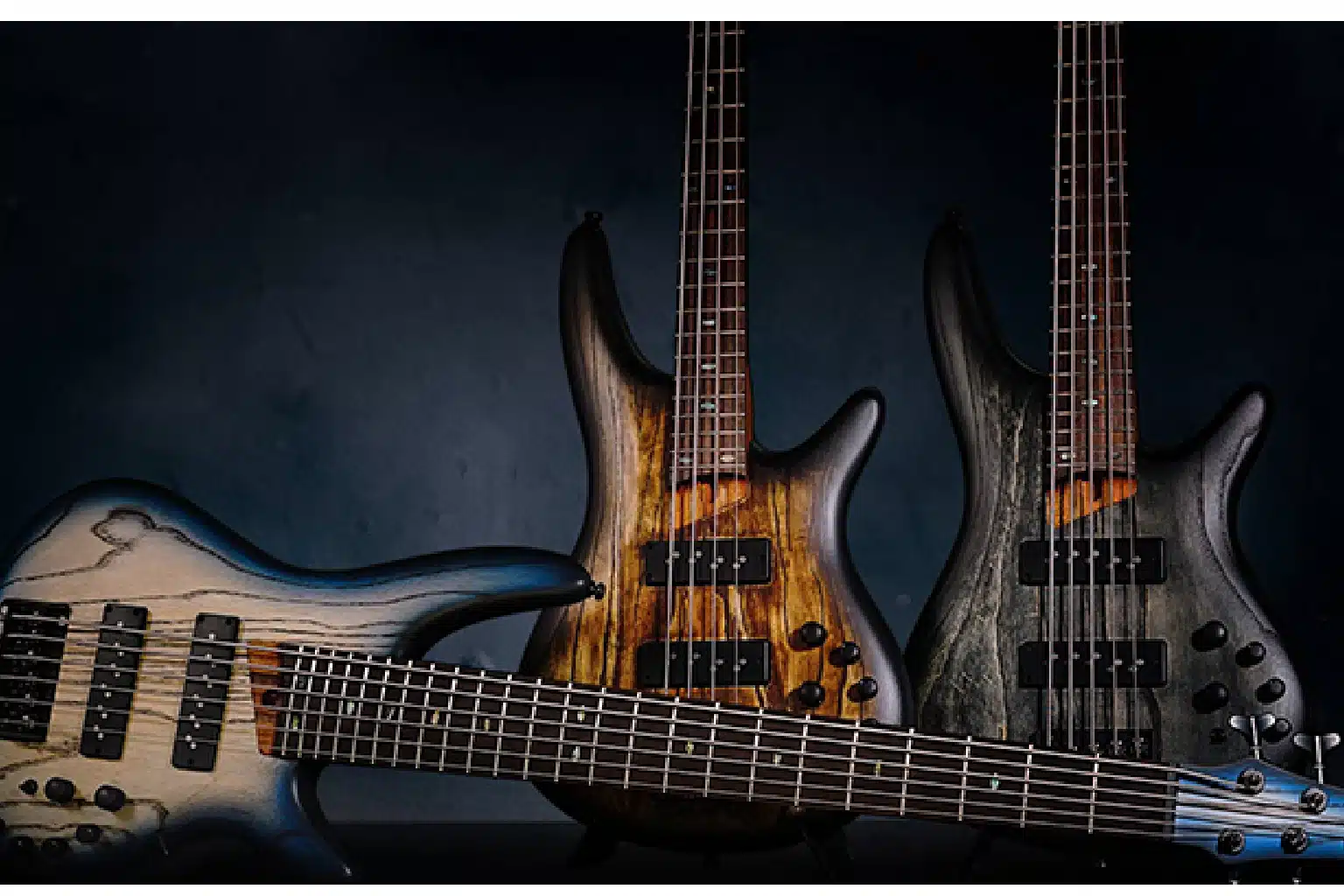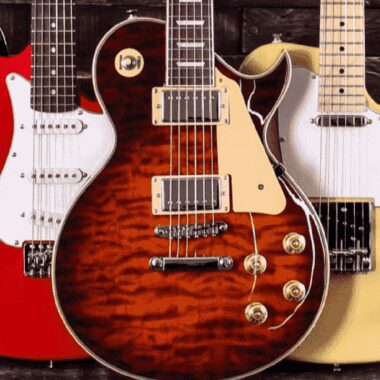Guitar Shops in Nairobi: Your Ultimate Guide to Finding the Perfect Instrument
Nairobi’s thriving music scene is accompanied by a growing market for guitars and guitar accessories. From electric guitars for rock and jazz to acoustic guitars perfect for folk and pop, Nairobi has a range of options for musicians of all skill levels. Whether you’re a beginner, an advanced player, or a professional musician, there are various shops across the city that cater to different budgets and styles. This blog post will guide you through the best guitar shops in Nairobi, what each shop offers, and tips on finding the perfect guitar to match your needs.

Why Guitar Shops Are Essential to Nairobi’s Music Scene
Guitar shops in Nairobi are vital to the city’s thriving music culture. They serve not only as retail spaces but as community hubs where musicians of all levels gather to explore instruments, share experiences, and connect with fellow artists. In recent years, Nairobi’s music scene has become increasingly diverse and dynamic, with genres like jazz, rock, reggae, and traditional African music gaining widespread popularity. Guitar shops are essential to supporting this creative growth, offering access to quality instruments, personalized services, and community engagement that fuels the city’s artistic vibrancy.
Supporting Musicians of All Levels
One of the most important roles of Nairobi’s guitar shops is their support for musicians at every stage of their musical journey. From beginners to seasoned professionals, these stores provide tailored advice, ensuring that each customer finds the right guitar for their needs. Whether someone is looking for an affordable acoustic guitar to start with, or a professional-grade electric guitar for advanced performances, the staff in these shops are trained to guide customers in making informed choices. This individualized support is crucial, as it enables musicians to start or progress in their craft with confidence.
Additionally, many of Nairobi’s guitar shops offer setup services to ensure instruments play optimally. For example, they provide assistance with string replacement, tuning, and minor repairs. By helping customers maintain their guitars, these shops contribute to the long-term satisfaction of musicians, who in turn feel motivated to improve their skills and stay engaged in the music community.
Enhancing the Availability of Quality Instruments
Quality instruments are essential for producing good sound, and Nairobi’s guitar shops ensure that local musicians have access to a range of reputable brands and models. They carry international brands like Yamaha, Fender, and Gibson, known for their reliability and excellent sound quality, as well as locally made guitars crafted by Kenyan artisans. This diversity allows Nairobi’s guitar shops to cater to a variety of preferences and budgets, ensuring everyone has the opportunity to find an instrument that resonates with them.
Locally crafted guitars are especially popular among those who seek unique, culturally relevant instruments. By showcasing local craftsmanship alongside well-known brands, Nairobi’s guitar shops promote the city’s artistry and offer musicians a broader selection of instruments that reflect the city’s rich musical heritage. This support of local artisans not only provides Nairobi musicians with more choices but also helps foster the growth of Kenya’s own guitar-making industry.
Promoting Community and Networking Opportunities
In addition to selling guitars, Nairobi’s guitar shops often host events and gatherings that bring musicians together. These events can include open jam sessions, guitar workshops, and product demonstrations by experienced musicians. By creating these communal spaces, guitar shops in Nairobi become more than retail stores; they transform into meeting points where musicians can exchange ideas, collaborate on projects, and inspire one another.
Some shops also partner with local music schools to offer group lessons and beginner workshops, further supporting Nairobi’s community of musicians. These educational programs make learning guitar more accessible to the public, encouraging a new generation of guitarists to develop their talents. Networking opportunities are especially valuable in Nairobi’s music industry, as musicians often benefit from collaboration and mentorship in a scene that is rapidly evolving.
Providing Access to Accessories and Specialized Gear
Nairobi’s guitar shops also serve as one-stop destinations for accessories and specialized gear. Beyond guitars, they offer a range of products that enhance a musician’s experience, including amplifiers, pedals, cases, straps, picks, and tuners. These items are essential for expanding a guitarist’s capabilities and allowing for greater creative expression. For instance, guitar pedals can create unique sounds, while amplifiers enhance volume and depth, both of which are necessary for live performances.
Having easy access to these accessories within Nairobi allows musicians to experiment with different styles and sounds. It eliminates the need to order equipment from abroad, which can be costly and time-consuming. By stocking these essential items, Nairobi’s guitar shops enable musicians to fully equip themselves and enjoy a more comprehensive musical experience.
Guitar shops are crucial to Nairobi’s music scene, offering more than just instruments—they provide support, community, and resources that drive the city’s musical culture. From their assistance with choosing the right guitar to the networking opportunities they create, these shops empower Nairobi’s musicians to grow, experiment, and excel in their craft. Through their dedication to quality instruments, local artisans, and community involvement, Nairobi’s guitar shops play an integral role in fostering a vibrant, inclusive music scene in Kenya’s capital.
Top Guitar Shops in Nairobi
For anyone in Nairobi looking to purchase a guitar, the city offers a range of music stores that cater to both beginners and professional musicians. From international brands to locally crafted instruments, Nairobi’s top guitar shops provide quality instruments, expert advice, and a sense of community for musicians. Here’s a look at some of the most popular guitar shops in the city and what makes each of them unique.
1. Assanand’s Music Store
Located in the heart of Nairobi’s CBD, Assanand’s Music Store is one of the oldest and most trusted names in the Kenyan music retail industry. Known for its wide variety of musical instruments, including guitars, the store stocks brands like Yamaha, Fender, and Gibson. Assanand’s is also known for its customer service, with knowledgeable staff who are ready to help customers find the right guitar, whether they are beginners or experienced players.
In addition to selling instruments, Assanand’s offers guitar accessories, including strings, picks, cases, and amplifiers. The store also provides after-sales services such as setup and maintenance, ensuring that customers get long-term value from their purchases. Assanand’s central location and comprehensive range make it a top choice for musicians in Nairobi.
2. Musicland Kenya
Musicland Kenya is another well-regarded music store in Nairobi, catering to guitarists and musicians of all backgrounds. This shop is known for offering a diverse selection of guitars, from acoustic and classical models to electric and bass guitars. Musicland also carries amplifiers and other essential gear, making it a convenient one-stop shop for guitarists.
One of Musicland’s standout features is its commitment to affordability. The shop frequently offers discounts and promotions, making it accessible to musicians on a budget. Additionally, Musicland Kenya is known for its friendly and helpful staff, who can provide advice on selecting the right instrument and accessories to suit any skill level or musical style.
3. Melodica Music Stores
With branches across Nairobi, Melodica Music Stores has become a popular destination for musicians looking for quality instruments. Melodica offers a range of guitars, from reputable brands to locally crafted options, catering to a variety of price points and styles. Whether you’re looking for a basic acoustic guitar for practice or a high-end electric model for performance, Melodica has options to suit your needs.
One of Melodica’s key strengths is its focus on education. The store partners with music schools and offers lessons for beginners interested in learning guitar. This added service has made Melodica a popular choice for those who are new to playing the guitar and want support in developing their skills. Melodica’s commitment to community involvement and music education adds to its appeal for Nairobi’s musicians.
4. Sol Music Store
Sol Music Store, located in the Kilimani area, is known for its extensive selection of guitars, amps, and accessories. The store prides itself on providing high-quality instruments at competitive prices. With brands like Ibanez, Epiphone, and PRS, Sol Music Store attracts seasoned musicians looking for professional-grade equipment.
Sol Music Store also offers repair and customization services, which sets it apart from many other stores in Nairobi. The shop’s staff are skilled in handling guitar setups and minor repairs, allowing customers to keep their instruments in top condition. This added layer of service makes Sol Music Store a go-to spot for serious musicians who value both quality instruments and expert maintenance support.
5. Nairobi Guitar Hub
Nairobi Guitar Hub specializes exclusively in guitars and accessories, making it a haven for guitar enthusiasts. The shop is known for carrying a curated selection of guitars, including acoustics, electrics, and bass guitars. Nairobi Guitar Hub also stocks boutique and hard-to-find brands, appealing to musicians who are looking for something unique.
Beyond selling guitars, Nairobi Guitar Hub is also known for its community focus. The store regularly hosts events, workshops, and jam sessions that allow guitarists to learn and connect with each other. The shop’s dedication to fostering a community of musicians has earned it a loyal following in Nairobi, particularly among guitarists who are looking to improve their skills and network with others.
6. Gear Hub Music Store
Gear Hub Music Store is a newer addition to Nairobi’s music scene but has quickly gained a reputation for its modern approach and customer-focused service. Located in Westlands, Gear Hub offers a selection of high-quality guitars, both new and used, making it an accessible choice for musicians on different budgets.
The store’s focus on technology and innovation is a highlight, with options to purchase equipment online and a strong presence on social media. Gear Hub also provides repair services, ensuring that musicians can get quick and efficient support if they run into issues with their guitars. The store’s emphasis on customer satisfaction and convenience makes it a valuable resource for Nairobi’s music community.
Nairobi’s top guitar shops each bring something unique to the city’s music scene, from comprehensive selections and affordable prices to community-building efforts and high-quality repair services. Whether you’re a beginner seeking a first instrument or a professional looking for specialized gear, these stores provide the expertise, equipment, and support that musicians in Nairobi need. By exploring these top guitar shops, Nairobi’s guitarists can find instruments that inspire them and foster connections that enrich their musical journey.
What to Look for When Buying a Guitar
Choosing a guitar from one of the many guitar shops in Nairobi can be an exciting but sometimes overwhelming experience, given the vast options available. Whether you’re a beginner looking to start your musical journey or an experienced player in search of an upgrade, there are key factors to keep in mind to make the right choice. Here’s a guide to what you should consider when buying a guitar to ensure you get the best instrument for your needs.
1. Type of Guitar
The first decision involves selecting the type of guitar. Typically, guitar shops in Nairobi offer a variety of guitars, including acoustic, electric, bass, and classical models. Each type serves different musical styles:
- Acoustic guitars are versatile, perfect for various genres from folk to rock, and great for beginners due to their ease of use.
- Electric guitars require amplification but allow for a range of sounds, ideal for rock, jazz, and blues.
- Classical guitars feature nylon strings, making them softer on fingers and suitable for classical and flamenco music.
- Bass guitars provide rhythm and are essential in bands across genres like rock, funk, and jazz.
Choosing the right type depends on your music style, preferences, and experience level. It’s wise to try each type if you’re uncertain, as the feel and sound vary significantly.
2. Budget and Quality
Setting a budget before shopping can help you narrow down your options. Fortunately, many guitar shops in Nairobi offer affordable yet high-quality options for beginners and intermediate players. For beginners, it’s best to start with a guitar that provides good sound quality without breaking the bank. Intermediate and advanced players might want to invest in a higher-end model with better tone and build quality.
Remember that quality does not always correlate with price; some mid-range guitars provide excellent value. It’s essential to assess the guitar’s material, craftsmanship, and brand reputation.
3. Playability and Comfort
A comfortable guitar is essential, especially if you plan to practice for extended periods. Pay attention to the guitar’s weight, body shape, and neck width. Beginners often find slim necks easier to handle, while some experienced players prefer wider necks for more control. Try holding the guitar to see how it feels; comfort is subjective, and a guitar that feels good will encourage you to play more often.
Also, ensure that the guitar is well-set up; strings should not be too high off the fretboard, and the action should feel smooth. Some guitar shops in Nairobi offer setup services to adjust string height, intonation, and tuning stability.
4. Sound and Tone
When testing a guitar, focus on its sound and tonal qualities. Acoustic guitars vary in tone depending on wood type, body size, and construction, so it’s helpful to play a few chords or fingerstyle patterns to see how it resonates. Electric guitars offer more flexibility with tone settings and amplification, so consider your preferred music style and experiment with different amp settings if possible.
Visiting a physical store lets you hear the guitar’s natural sound and test how it reacts to different playing styles. Don’t hesitate to ask store staff for assistance or advice on tone adjustments that suit your music preference.
5. After-Sales Support and Maintenance
Buying a guitar is a long-term investment, and it’s helpful to choose a store that provides after-sales services, such as repair and maintenance. Many guitar shops in Nairobi offer tuning, string replacements, and minor repairs, ensuring that your guitar remains in top shape. Regular maintenance enhances the guitar’s lifespan and ensures that it sounds its best.
In summary, buying a guitar involves balancing personal preference, playability, sound quality, and budget. With the right guidance from Nairobi’s well-equipped guitar shops, you can find a guitar that aligns with your style and inspires your musical journey.
Accessories and Add-Ons to Consider When Buying a Guitar
When you visit guitar shops in Nairobi, you’ll likely notice a range of accessories and add-ons. These tools and gadgets can enhance your playing experience, help maintain your guitar, and make learning easier and more enjoyable. Here’s a rundown of essential guitar accessories you might want to consider adding to your shopping list.
1. Guitar Case or Gig Bag
A sturdy guitar case or gig bag is essential for protecting your guitar from damage, whether you’re storing it at home or taking it to rehearsals and performances. Hard cases provide the most protection, especially if you’re frequently traveling, as they shield the instrument from knocks and temperature changes. Gig bags are lighter and more affordable, with padded options offering sufficient protection for local travel or home storage. Investing in a good case is essential to prolong the life of your guitar.
2. Guitar Tuner
A tuner is an indispensable accessory for any guitarist, as maintaining proper tuning is key to producing a good sound. Whether you’re a beginner or an experienced player, a tuner ensures your guitar sounds accurate and harmonizes with other instruments. Most guitar shops in Nairobi offer various tuner types:
- Clip-on tuners attach to the headstock and read vibrations, making them convenient and portable.
- Pedal tuners are typically used by electric guitar players and can be integrated into a pedalboard.
- Smartphone apps are also an option, though dedicated tuners generally provide better accuracy.
3. Guitar Picks and Capo
Picks come in various thicknesses, shapes, and materials, each affecting your tone and playability. If you’re new to guitar, experiment with different pick sizes and styles to find the one that feels most comfortable. Heavier picks are often better for electric guitars, while lighter picks work well for acoustic strumming.
A capo, another useful tool, clamps onto the fretboard, allowing you to change the key without adjusting tuning. This is particularly helpful for beginners or players who want to experiment with new sounds and play along with different songs easily.
4. Strap and Strap Locks
If you plan to play standing up, a comfortable guitar strap is essential. Look for a strap with adjustable length and padding for better comfort, especially if your guitar is on the heavier side. Many guitar shops in Nairobi offer straps in various materials and designs, allowing you to personalize your instrument.
Strap locks are an add-on worth considering if you play live or move around frequently with your guitar. These small clips secure your strap firmly, reducing the risk of the guitar slipping out of the strap and falling.
5. Strings and String Cleaner
Guitar strings wear out over time, affecting sound quality and playability. Having a spare set of strings ensures you’re prepared if a string breaks, and changing strings regularly keeps your guitar sounding fresh. Many Nairobi guitar stores offer different string types, including light, medium, and heavy gauges, suited for various play styles.
String cleaners and conditioners can also help prolong string life by removing dirt and oil buildup, which can dull your sound. Keeping your strings in good condition improves the quality of your music and saves you money on frequent replacements.
6. Other Useful Accessories: Stand, Pedals, and Maintenance Kits
- Guitar stand: A stand keeps your guitar secure and accessible when not in use, reducing the risk of accidental damage.
- Pedals: If you play an electric guitar, consider adding effects pedals to enhance your sound. Nairobi stores often stock popular pedals like distortion, delay, and reverb.
- Maintenance kit: A kit with tools like a truss rod wrench, cleaning cloth, and polish is useful for maintaining your guitar’s condition and ensuring it performs well over time.
In summary, accessories can significantly improve your guitar-playing experience, from ensuring proper tuning to enhancing sound quality. Guitar shops in Nairobi offer a variety of these add-ons, making it easy to equip yourself with all you need for a rewarding music journey.
Online Guitar Shopping in Nairobi
In recent years, online shopping for guitars has grown in popularity, providing Nairobi’s musicians with an easy, accessible way to purchase instruments and gear. While traditional brick-and-mortar shops have long been the go-to for buying guitars, many players are now considering online platforms for their next purchase. Here’s a look at some of the key benefits and considerations when shopping for guitars online in Nairobi.
1. Convenience and Accessibility
Shopping for guitars online offers unmatched convenience. Whether you’re a busy professional or a student, the option to browse, compare, and purchase a guitar from the comfort of your home is a huge advantage. Online platforms often provide detailed product descriptions, images, and even demo videos, allowing you to thoroughly research your options before making a purchase. This level of accessibility is particularly helpful for musicians in Nairobi who might not live close to a physical store.
2. Wide Range of Options
Online guitar shopping expands the range of instruments and brands available to you. While physical stores are limited by shelf space, online shops can stock an extensive selection of guitars, from budget-friendly models to high-end instruments, and offer a range of brands and styles. Additionally, many online retailers partner with international suppliers, which means you can access brands and models that may not be available in Nairobi’s local shops. This diversity allows musicians to find the perfect guitar that meets their specific needs and preferences.
3. Competitive Prices and Deals
One of the main attractions of online shopping is the potential for lower prices. Online retailers often have fewer overhead costs than physical stores, enabling them to offer competitive pricing. Many websites also offer regular discounts, promotions, and free shipping options, which can make a significant difference in cost. Additionally, you might find bundle deals that include essential accessories, such as tuners, strings, and cases, at a reduced price. Taking advantage of these deals can make online shopping an economical choice for musicians in Nairobi.
4. Customer Reviews and Expert Recommendations
Online shopping provides access to customer reviews and expert recommendations, which can be valuable in making an informed purchase. Reading reviews from other guitar players gives you insight into the instrument’s performance, durability, and sound quality. Some online stores even feature video demos or reviews from professional musicians, providing more context on the guitar’s characteristics and capabilities. This added layer of information helps you make a more confident decision, even if you’re buying without physically testing the guitar.
5. Considerations and Challenges
While online shopping offers many benefits, there are a few challenges to keep in mind. Buying a guitar online means you can’t test its feel or sound in person, which is essential for some players who want to experience the instrument’s resonance and playability firsthand. However, many online stores have return policies that allow for exchanges or refunds if you’re not satisfied with your purchase. Additionally, checking the warranty and after-sales support options is essential to ensure you’re covered in case of any issues.
6. Where to Shop
Several reputable online platforms serve Nairobi’s guitar community, including local websites that specialize in musical instruments and international retailers that ship to Kenya. Exploring these options and comparing prices can help you find the best deals and a wider selection of instruments.
In summary, online guitar shopping in Nairobi offers a convenient and cost-effective alternative to traditional music stores. By leveraging the variety, competitive prices, and accessibility of online platforms, Nairobi’s musicians can find the right guitar to suit their musical journey.


